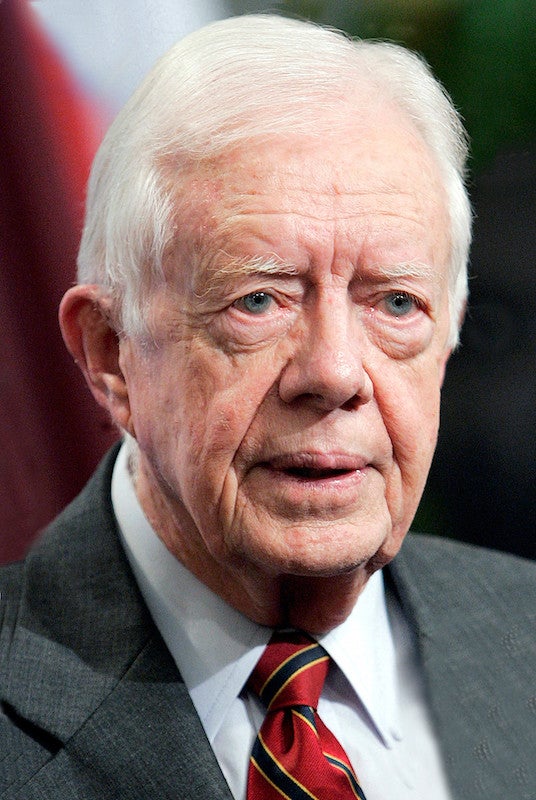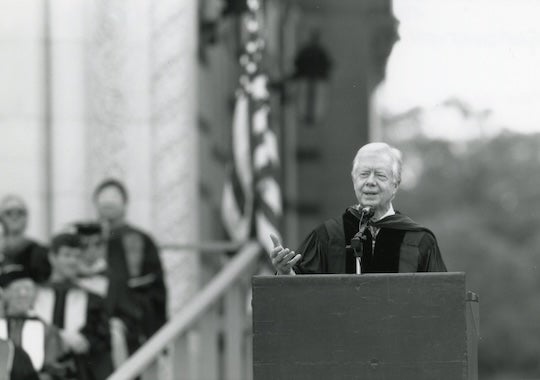Following the death of former President Jimmy Carter and ahead of his state funeral Jan. 9, Rice University faculty and Baker Institute for Public Policy leadership are remembering his life, legacy and connection to the university.
Presidential historian and author Douglas Brinkley, the Katherine Tsanoff Brown Professor in Humanities at Rice, spent considerable time with the late former president in the U.S. and abroad and authored “The Unfinished Presidency: Jimmy Carter’s Journey Beyond the White House.”
“Without question, he had one of the greatest post-presidencies of any American president and was really underestimated during his time in office,” Brinkley said.
Carter visited Rice on three separate occasions. The first was as the university’s commencement speaker May 8, 1993. His next Rice trip was June 30, 2005, when he attended a meeting of the Commission on Federal Election Reform that he co-chaired with James A. Baker III, the former secretary of state who now serves as honorary chair of Rice’s Baker Institute.
“Our nation has lost a tireless and dedicated leader who practiced what he preached to help us all build a better world,” Baker said. “From the Georgia governor’s mansion to the White House and then to his exemplary career after elected office, President Carter maintained special thoughtfulness and care for the downtrodden throughout his career. A firm believer that bipartisan solutions can withstand the test of time, he worked with the George H. W. Bush administration to resolve the longstanding wars in Central America. My wife, Susan, and I will miss his broad smile and boundless energy, and we send Amy and the entire Carter family our heartfelt sympathy.”
Carter’s last visit was May 20, 2008, when he participated in a discussion with Baker following the Baker Institute’s screening of the 2008 film “Recount.” In addition, the institute’s Presidential Elections Program worked with the Carter Center in 2021 to co-host various events and webinars that examined the U.S. electoral system, and the partnership continues to this day.
“President Carter was a valued participant in Baker Institute events over the years,” said David Satterfield, director of the Baker Institute and former U.S. ambassador to Lebanon and Turkey. “Committed during his presidency and in the many decades after to the cause of peace and international understanding, his achievements from the Camp David Accords onward are his enduring legacy. We join in the celebration of his life.”
Mark Jones, a Rice professor of political science and fellow at the Baker Institute where he co-directs the presidential elections program, said while most presidents are best remembered for their contributions to the country while serving in office, Carter — the 2002 Nobel Peace Prize recipient — is remembered more for his 40-plus years of servant leadership after leaving the White House.
“In addition to his well-known charitable activities, Carter steadfastly promoted peace and democracy around the world and in the U.S., including co-chairing, with James A. Baker III, the country’s last major bipartisan election reform commission in 2005,” Jones said. “The legacy of this bipartisan approach to the increasingly contentious topic of election reform championed by President Carter is being continued today as part of a joint project between the Carter Center’s Democracy Program and the Baker Institute’s Presidential Elections Program.”
Nathan Citino, the Barbara Kirkland Chiles Professor of History and chair of history, is a historian of U.S. foreign relations whose research focuses on the Middle East.
“Carter’s brokering of the Camp David Accords and the Egypt-Israel Peace Treaty is certainly seen as a high point in terms of how his administration is remembered. I see it as a missed opportunity, however, that didn’t address the core issues of the Israeli-Palestinian conflict and that actually set the stage for further violence and a stalemated Middle East peace process,” Citino said. “This was unfortunate, because Carter did come into office with broader ambitions. After he was voted out of office, when he was free from the constraints of American politics and especially the bipartisan consensus in support of Israel, he would devote more attention to consideration of Palestinian rights and what he regarded as a two-state solution. By then, of course, he no longer wielded official power, exercising informal influence as an ex-president and through the Carter Center.”
Ric Stoll, the Albert Thomas Professor Emeritus of Political Science, said while Carter had a number of important achievements related to foreign and defense policy during his presidency, his greatest legacy is his devotion to human rights.
“Although his actions on human rights are most often associated with his postpresidency, a look at his actions as president shows that this issue was always an important driving force for him,” Stoll said. “For example, he criticized the Soviet government for denying basic civil rights to Russian Jews.”
A video remembrance from Baker is online at https://www.youtube.com/watch?v=fpADwHuVO9U.
Media are encouraged to download photos and Carter’s Rice commencement speech here: https://rice.app.box.com/folder/287068772704?s=s37oy7fjkm2o0xr8cbi8xbyl5fvq8x4i.


